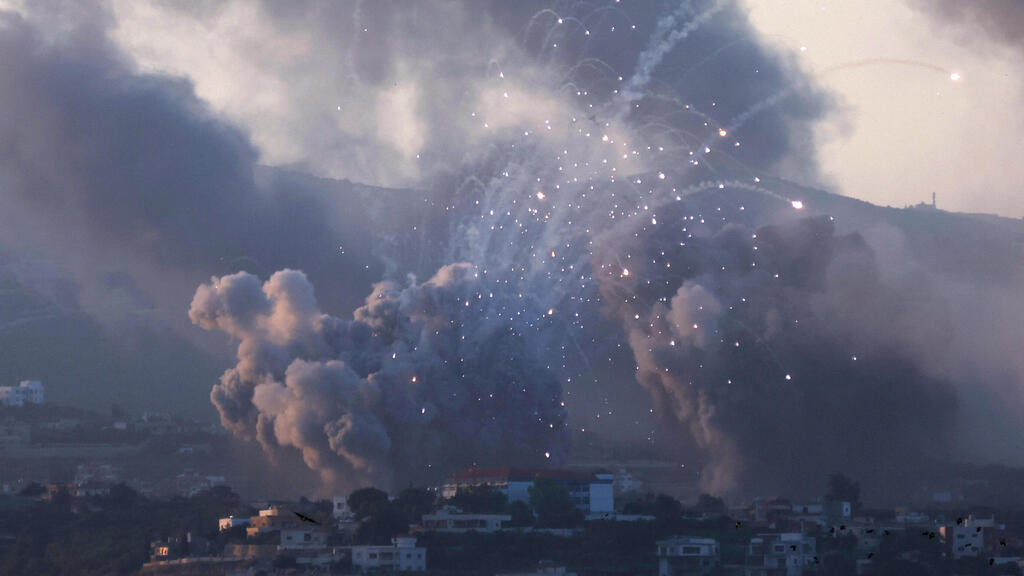Getting your Trinity Audio player ready...
Prime Minister Benjamin Netanyahu said during security consultation that preceded the cabinet meeting late Wednesday night that "negotiations will only be under fire," but Thursday morning Sky News reported citing senior officials in the Biden administration that the cease-fire with Hezbollah is expected to come into effect in the coming hours. The Prime Minister is currently flying to New York, where he will speak at the United Nations on Friday, and his office has yet to respond to the report.
The U.S. officials indicated that the ceasefire will last 21 days, as called for overnight in a statement by U.S. President Joe Biden and French President Emmanuel Macron, which was also joined by Australia, Canada, the European Union, Germany, Italy, Japan, Saudi Arabia, the United Arab Emirates and Qatar. As of 3:30 p.m. on Wednesday, no rocket alert sirens were heard in the north. The IDF, meanwhile, continued its attacks in Lebanon.
"During these 21 days, the parties will hold negotiations. We hope for a solution that will return the citizens of both countries to their homes," a U.S. official said. He added that "the agreement will only be valid in Lebanon, but it will also buy time for negotiations with Hamas in Gaza. A diplomatic solution can be achieved."
The report led to stormy reactions in the political system. Finance Minister Bezalel Smotrich said that "the campaign in the north should end in one scenario - crushing Hezbollah and denying its ability to harm the residents of the north. We must not give time to the enemy to recover from the severe blows it has received and to reorganize for the continuation of the war after 21 days. Surrender of Hezbollah or war, this is the only way we will restore the residents and security to the north and the country."
Minister Orit Struck also attacked: "There is no moral mandate for a cease-fire. Neither for 21 days nor for 21 hours. Hezbollah turned Lebanon into a barrel of explosives. UN Resolution 1701 turned the residents of the north into hostages, and exiles in their own country. We do not repeat past mistakes. We won't stop until it is fixed."
Minister of Culture and Sports Miki Zohar added that "the cease-fire without any significant return on the part of Hezbollah is a serious error that endangers Israel's major security achievements in recent days. I really hope that the reports are not true, we must continue with all our might until a clear decision is made in the north."
2 View gallery


Prime Minister Benjamin Neanyahu has not commented on the reports
(Photo: Ronen Zvulun/Reuters)
Former Prime Minister Naftali Bennett said: "So now suddenly the world is pushing for a cease-fire with Hezbollah. It just doesn't work that way. Israel reacted very late and began to gradually destroy Hezbollah. So suddenly, the world decides that now is the time for a cease-fire? Israel must remove Hezbollah as a threat to our families. If Hezbollah wants the fire to stop, let it disarm and move 15 km away from the Israeli border."
In contrast to these words, opposition leader Yair Lapid said that Israel "should announce this morning that it accepts the Biden-Macron cease-fire proposal, but only for seven days, in order not to allow Hezbollah to restore its command and control systems. We will not accept any proposal that does not include removing Hezbollah from our northern border."
U.S. President Joe Biden and French President Emmanuel Macron issued a joint statement overnight between Wednesday and Thursday calling for an immediate 21-day cease-fire between Israel and Hezbollah. ""It is time for a settlement on the Israel-Lebanon border that ensures safety and security to enable civilians to return to their homes," the statement reads. "We call on all parties, including the governments of Israel and Lebanon, to endorse the temporary cease-fire immediately." Senior White House officials hinted that Israel and Lebanon were familiar with the agreement, and even endorse it.
A senior White House official said that the statement was coordinated with the Israeli and Lebanese governments and that they could endorse it in the coming hours. "This is a breakthrough, we will try to use the time to make achievements on all fronts, including Gaza.," he said.
The official added that 21 days is a long enough period to allow practical contacts to reach a "very complex agreement. It's not some magic formula, but we thought it fit. We have held talks in recent months and we hope to use these 21 days to reach a permanent agreement that will allow citizens to return to their homes, that is the goal."
The cease-fire will be along the blue line dividing Lebanon from Israel approved by the UN in 2000 for the purpose of determining whether Israel had fully withdrawn from Lebanon; During the cease-fire the parties would discuss a comprehensive agreement that will allow civilians to return to their homes in both Israel and Lebanon, according to the official.
"This is a great effort that has been made during the last 48 hours. The president and his advisers have dealt with this with countries around the world. Lebanon and Israel have worked tirelessly to reach this moment and we value their cooperation," according to the official.
U.S. officials said Hezbollah would not be a signatory to the cease-fire but believed the Lebanese government would coordinate its acceptance with the group, and that once it is approved by LEbanon it would be understood that Hezbollah is involved. They said they expected Israel to “welcome” the proposal and perhaps formally accept it when Israeli Prime Minister Benjamin Netanyahu speaks at the General Assembly on Friday.




